Frozen 2‘s Themes Become Darker Even as the Kid Gloves Stay On

The colossal success of 2013’s Frozen guaranteed a sequel, so Frozen 2’s release on the cusp of winter movie season comes as no surprise. What is a surprise is the seriousness of the sequel’s material, at least on paper, compared to its predecessor. Functionally (and strangely?), Frozen 2 feels like a remake of Alex Garland’s doleful 2018 sci-fi horror film Annihilation, scrubbed of its weird fiction elements for the sake of it chief demographic.
Not that directors Jennifer Lee and Chris Buck needed mutant bear attacks or morbid fungal blooms to give the film more mature, darker themes. Whether in making observations about life’s fleeting preciousness, the sins of a nation’s past or even continuing with the questions of self-determination and identity, Frozen 2 has plenty of those. Unfortunately, the script constantly hedges and hamstrings itself on these issues, as if operating under the mistaken assumption that kids can’t stomach the darker stuff. Lee and Buck may successfully pasteurize the script’s grim side, but the accomplishment comes at the expense of lasting emotional resonance.
The story picks up three years after Frozen. Arendelle is a bustling, thriving fantasy kingdom made immediately appealing as only fantasy can do: The charming, European-influenced cobblestone hamlet rests beside a gleaming castle, a bulwark overlooking the harbor on which the town resides. Despite this scenic charm, heavy lies the crown for Queen Elsa (Idina Menzel). Her subjects love her, and she’s never been closer with her sister, Anna (Kristen Bell), but she’s troubled by a mysterious, ethereal tone recently calling her northerly. So she sets out with Anna, Kristoff (Jonathan Groff), and Olaf (Josh Gad) to discover the song’s source and learn a bit about herself along the way.
-

-

-

-

-

-

-

-

-

-

-

-

-

-

-

-

-

-

-

-

-

-

-

-

-

-

-

-

-

-

-

-

-

-

-

-

-

-

-

-








































